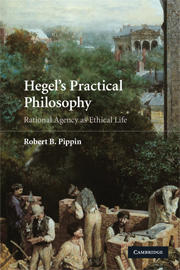1 - Introduction: leading a free life
Published online by Cambridge University Press: 05 June 2012
Summary
In Hegel's Encyclopedia system, what contemporary philosophers would call practical philosophy is called the “philosophy of spirit [Geist].” By “practical philosophy” most philosophers nowadays would mean an account of the distinct sorts of events for which we may appropriately demand reasons or justifications from subjects whom we take to be responsible for such events occurring. As it is sometimes put, to focus appropriately on that issue we also need to ask for a broad delimitation of the practical normative domain (whatever is done for reasons, purposively, where reference to such reasons is essential in understanding what was done), and so are asking about the possibility that there are these distinct sorts of events, actions, things done for reasons. That there may be no such distinction, that there might be just natural objects and their properties and ontologically uniform natural events, has been a major issue in modern practical philosophy for some time now. We often ask as well, sometimes as an independent question in practical philosophy, sometimes as tightly interwoven with an answer to the first, for an assessment of what rightly should count as such reasons or justifications, as distinct from what subjects might as a matter of fact themselves count as such reasons. In accounts that tie acting well to the exercise of practical reason, these discussions obviously include claims we take to be of the highest importance – ethical and moral sorts of reasons, questions of right or justice, etc.
- Type
- Chapter
- Information
- Hegel's Practical PhilosophyRational Agency as Ethical Life, pp. 3 - 35Publisher: Cambridge University PressPrint publication year: 2008

